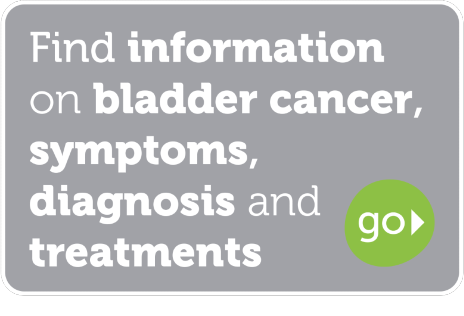Symptoms
SYMPTOMS OF BLADDER CANCER
It is very important that you visit your GP as soon as you notice anything unusual - the earlier that bladder cancer is diagnosed, the more quickly it can be treated and the better the outcome.
The most common symptoms are:
- Blood in the urine (even just once)
- Recurrent urinary infections
- Frequency or urgency or pain on passing urine when no infection found on urine tests by the doctor
BLOOD IN THE URINE
The most common symptom of bladder cancer is when someone passes blood in their urine when they go to the toilet (called Visible or Macroscopic Haematuria). Your urine could look pink, red or rusty/brown coloured. It might be very slight or sometimes the bleeding can be heavy, and you might see streaks or clots in the urine.
Sometimes the clots formed in the bladder may be difficult to pass and the person is unable to urinate, which leads to urine retention - not being able to wee. If this happens, a visit to the A&E department of a hospital is needed to relieve the retention with a catheter (a fine tube passed into the bladder to drain off urine and blood).
It may only happen once. It may only be a little. It might go away and not come back again until months after the initial bleed. Just because the bleeding has stopped doesn't mean that the problem has resolved.
It is very important that you go to see your doctor at the first sign of blood. Even if it goes away for now - don't wait.
The following quote from Phil demonstrates just how important it is not to ignore the signs of blood in your urine:
"I only saw blood in my urine once and I thought I would wait to see if it happened again. But my wife didn't agree and encouraged me to go straight to my GP. It turned out to be High Risk bladder cancer. I was VERY lucky indeed! Please don't hesitate - any time you see any blood in your wee - go straight to your GP!"
Bladder cancer symptoms in women can be tricky to notice. If you are still having periods it can be difficult to decide whether the blood is in your urine or part of your period. Symtoms can also sometimes be mistaken for other gynaecological issues. If in any doubt please go and see your GP who can arrange appropriate investigations depending upon whether any other symptoms or signs are present. If you are no longer having periods, you need to be aware that bladder cancer is more common after the menopause and any bleeding down below should be investigated without delay.
The following quote is from Caroline:
"I first noticed something in the middle of May this year. There were two tiny spots of blood, the size of a pin head, on the paper. I'd had an operation to remove the lining of my womb two years before, so I just thought it might be related to that and didn't think anything more of it. A couple of weeks later, when I was out with friends during the Bank Holiday weekend, I went to the toilet and noticed blood on the paper again, along with a streak of blood in my urine. I went to see my doctor straight away and gave a urine sample..." You can read Caroline's story here Action Bladder Cancer UK and see how she had repeat visits to her GP before she was sent for tests for bladder cancer.
Sometimes blood in the urine isn't visible to the naked eye and is only detected when your doctor sends a sample to the laboratory to check for a urine infection, or tests the urine sample with a special urine dipstick testing stick in the surgery. This is called Non-visible or Microscopic Haematuria).
Non-visible blood in the urine is much less likely to be due to bladder cancer than if the blood is visible to the naked eye. This is especially true if there are no other symptoms, e.g. pain on passing urine, increased urgency. However, some people will require checks to exclude bladder cancer, especially of you are over 50 years old, or a smoker, or if you have new urinary symptoms in addition. For many younger people, this non-visible blood is almost always leaking from their kidneys, and is of little consequence, other than requiring a blood and urine test once a year to keep an eye on kidney function.
RECURRENT URINARY INFECTIONS
Another common symptom of bladder cancer, especially in women, is visible blood in the urine associated with a urinary tract infection (UTI). Your GP may diagnose a UTI and treat you with antibiotics and the bleeding may well settle. The nature of bladder cancer is that bleeding is often intermittent so it may appear that the antibiotics have "cured the problem". Visible blood in the urine should be investigated and not assumed to be due to an infection, especially if you are a smoker (the biggest single risk factor for developing bladder cancer). So if your GP diagnoses a UTI when you have seen blood in your urine, make sure you ask whether you need further testing to rule out bladder cancer or other issues. This is especially important if the urine test does not confirm the presence of infection despite typical symptoms - if you see blood in the urine during a suspected urine infection, it is worth checking with your surgery that the tests carried out confirm the presence of an infection.
Pain on passing urine or passing urine frequently
Occasionally a symptom of bladder cancer can be non specific urinary symptoms such as pain or a burning feeling on passing urine (called dysuria) or needing to pass urine urgently or frequently, and when the urine is tested by the doctor there may well be traces of non-visible blood (see above). If you have all these signs and symptoms present together you need to make your doctor aware and ask them to make further tests.
These symptoms might also be caused by small stones that develop in the kidneys moving down the tube from the kidney to the bladder, but further checks will look for all the potential causes.
GENERAL PAIN
Some people might experience pain in the lower back or stomach, but this kind of pain is an uncommon symptom in the initial stages of bladder cancer and may indeed only be a symptom occurring late in the disease.
If detected early bladder cancer is treatable and curable and most people with bladder cancer can lead a normal life following treatment. There are rapid referral systems set up across the UK for your doctor to access specialist hospital services if there is a concern that your symptoms are possibly due to bladder cancer. Only a minority of patients require aggressive treatment such as removal of the bladder or radiotherapy.
A single episode of visible blood in the urine in a man or woman of any age should ring alarm bells and you need to arrange to see your doctor urgently for further tests. Your doctor may well refer you to a specialist at your local hospital for further investigations.
If you see visible blood in your urine, and your doctor does NOT refer you for further investigation, you should ask your doctor to explain their reasons for not doing this. Unless you have had typical symptoms of a urine infection, with infection confirmed by the hospital laboratory, referral for further tests is almost always required.
Print out our short bladder cancer symptoms guide - share this with your family, friends and GP surgery
ABCUK Bladder Cancer Symptoms Guide.pdf
You can print off these Bladder Cancer Tips for GPs and make sure your surgery sees them - and point them to our website.
ABCUK BLADDER CANCER SYMPTOMS Primary Care.pdf
How we help you
Latest News / Events
Setting up a support group for your patients - Webinar for Nurses - Mon 18 Aug 2025 08/07/2025
This is a FREE ABC UK online Zoom session, which is being run in response to requests from urology and cancer nurses, on how to set up and run a successful patient support group. The session will be led by one of the ABC UK Patient Support team, together with two advanced nurse specialists...











